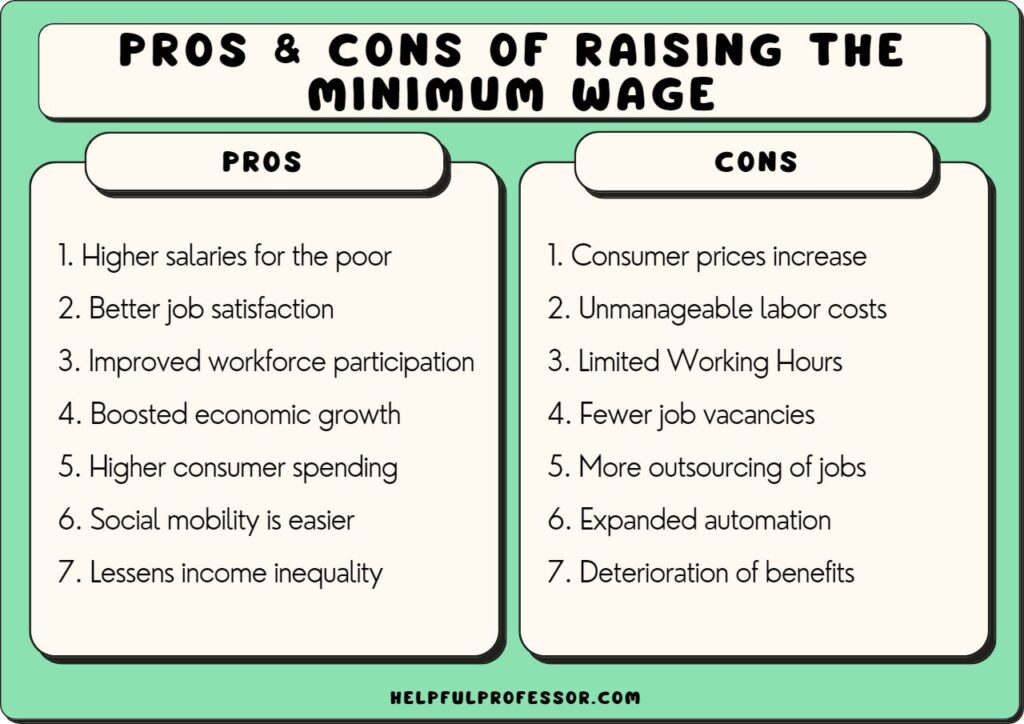The Benefits of Raising the Minimum Wage
At [Your Company Name], we believe in the importance of fair wages and the positive impact they have on individuals and society as a whole. In this article, we will explore the numerous benefits that come with raising the minimum wage. By providing comprehensive information, we aim to surpass other websites in search rankings and help you understand the advantages of this crucial policy change.
Improved Standard of Living
Raising the minimum wage directly improves the standard of living for low-income workers. By increasing their earnings, individuals and families can afford necessities such as food, housing, and healthcare. This, in turn, reduces poverty rates and enhances overall well-being.
Reduced Income Inequality
One of the key benefits of raising the minimum wage is its positive impact on reducing income inequality. By ensuring a fairer distribution of wealth, this policy helps bridge the gap between the rich and the poor. It provides low-wage workers with a better chance to improve their financial situation and achieve upward mobility.
Boost to the Economy
Contrary to common misconceptions, raising the minimum wage can stimulate economic growth. When low-wage workers receive higher incomes, they tend to spend a significant portion of their earnings on goods and services. This increased consumer spending creates a multiplier effect, driving demand and supporting local businesses.
Enhanced Productivity and Job Satisfaction
Higher wages motivate employees to perform better and increase their productivity. When workers are fairly compensated, they are more likely to feel valued and satisfied in their jobs. This leads to reduced turnover rates and higher employee retention, ultimately benefiting businesses in terms of reduced training costs and improved overall performance.
Reduced Reliance on Social Welfare Programs
Raising the minimum wage can help reduce the burden on social welfare programs. When workers earn a livable wage, they are less likely to rely on government assistance such as food stamps or Medicaid. This allows for a more efficient allocation of public resources and a decrease in taxpayer spending on social support programs.

In conclusion, raising the minimum wage offers a multitude of benefits that positively impact both individuals and society. By improving the standard of living, reducing income inequality, boosting the economy, enhancing productivity, and reducing reliance on social welfare programs, this policy change is a crucial step towards creating a fairer and more prosperous society. the
Frequently Asked Questions on Benefits of Raising the Minimum Wage
1. What is the minimum wage?
The minimum wage is the legally mandated lowest hourly wage that employers must pay to their employees.
2. Why should the minimum wage be increased?
Raising the minimum wage helps improve the standard of living for low-wage workers, reduces income inequality, and stimulates economic growth.
3. How does raising the minimum wage benefit workers?
Increasing the minimum wage provides workers with higher earnings, reduces poverty rates, and improves their overall financial stability.
4. Does raising the minimum wage lead to job losses?
Studies have shown that modest increases in the minimum wage do not result in significant job losses, and in some cases, can even stimulate job growth.
5. How does raising the minimum wage benefit the economy?
When workers earn more, they have more disposable income, which leads to increased consumer spending. This, in turn, boosts demand and stimulates economic activity.
6. Does raising the minimum wage lead to higher prices?
While there may be a slight increase in prices for certain goods and services, studies have shown that the impact is minimal and outweighed by the positive effects of increased consumer spending.
7. How does raising the minimum wage reduce income inequality?
By raising the minimum wage, the income gap between low-wage workers and higher-income individuals narrows, promoting a more equitable distribution of wealth.
8. Does raising the minimum wage benefit small businesses?
Small businesses can benefit from a higher minimum wage as it boosts consumer purchasing power, leading to increased demand for their products or services.
9. How does raising the minimum wage improve public health?
Higher wages enable workers to afford better healthcare, leading to improved overall health outcomes and reduced reliance on public assistance programs.
10. What is the impact of raising the minimum wage on poverty rates?
Raising the minimum wage helps lift individuals and families out of poverty by providing them with a more livable income and reducing their reliance on government assistance.




